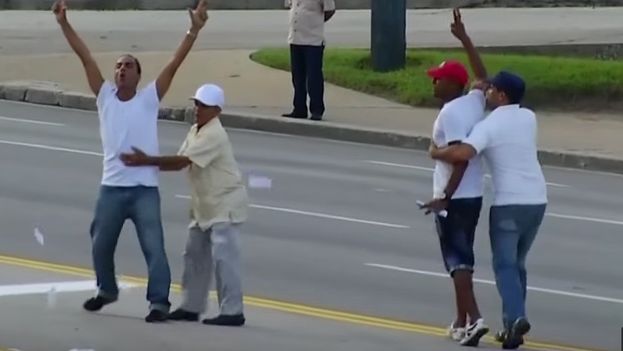
![]() EFE (14ymedio), Aboard the Papal plane, 22 September 2015 — Pope Francis said Tuesday that during his stay in Cuba he had no plans to grant audiences to “anyone,” on being questioned about why he had not held a meeting with members of the Cuban dissidence.
EFE (14ymedio), Aboard the Papal plane, 22 September 2015 — Pope Francis said Tuesday that during his stay in Cuba he had no plans to grant audiences to “anyone,” on being questioned about why he had not held a meeting with members of the Cuban dissidence.
On board the papal plane the pontiff added that he was not aware that there had been arrests of dissidents who had sought a meeting with him during his visit to the Island, which ended today in Santiago de Cuba.
“What I want to say is that I do not know,” the Pope told the international media, among them EFE, on the plane traveling from Cuba to the United States where he will complete the second part of this tenth international trip. “I do not know if they were or not,” he said after recalling that he greeted many people during his public events in Cuba and he wasn’t aware whether among them were any dissidents because “no one identified themselves.”
“In the first Nunciature it was clear I wouldn’t give audiences to anyone, because they asked,” admitted Francis, who revealed that among those who asked to have a meeting with him “was a chief of state,” whose identity he did nor reveal.
But asked if he would be willing to meet with Cuban dissidents, the Pope answered, “I like to meet all the people, I believe that first of all every person is a child of God and has the right” to it. “Dealing with another person is always enriching,” added Jorge Bergoglio.
The lack of a meeting with members of the political opponents of the Cuban regime was a matter the Vatican was asked about during the Pope’s visit to Cuba, but the Holy See insisted that there had never been a plan to have a formal meeting.
The Vatican did say that telephone contacts with dissidents were held to explore the possibility of some of its members greeting the pope, but in the end this did not happen.
Berta Soler, leader of the dissident movement Ladies in White, and the former political prisoner José Daniel Ferrer reproached the pontiff for failing to address in his homilies and speeches the situation of fundamental rights in the country.
“Truly, we know he is not the liberator of Cuba, the Pope came as a missionary of mercy and to discuss the approach of the Church with the government, which he said very nice words about in his homilies, but words such as respect for human rights and freedom were lacking,” Berta Soler told EFE.
Ferrer, coordinator of the opposition Patriotic Union of Cuba (UNPACU), lamented that there were no “clear statements” in the “timid” papal homilies, while “today there have been between 80 and 100 arrests of activists in Santiago de Cuba and neighboring municipalities to prevent them from attending Francis’s events.”
“We have not heard the term ‘human rights’ anywhere and we regret that the Pope has not spoken directly about the difficult situation in Cuba in this area,” he said. Nevertheless, former political prisoner Marta Beatriz Roque considered that the pope’s visit will bring “contributions,, as happened with John Paul II in 1998 and Benedict in 2012.
Roque, like Soler and independent journalist Miriam Leiva, were detained for some hours in the first two days of the papal visit, they complained, when they tried to attend events presided over by the Pope in Havana, at the invitation of the Apostolic Nunciature.
Leiva told EFE that although she could not meet with the Pope, she praised as “very positive” the fact that she had been invited because “it was a way to meet and listen to the opposition in Cuba” through them, and “to recognize a part of civil society that is ignored because the government does not listen.”
“The Pope’s pastoral objective was to share his message of mercy and its importance is that he came to the people with love, reconciliation and forgiveness, which are much needed in Cuba in the rescue of social values,” he said.
Elizardo Sanchez, spokesman for the Cuban Commission for Human Rights and National Reconciliation (CCDHRN), said that Francis’s visit has “special significance” for its “renewal” message of “hope” for the Cuban family and church-state relations. He also said that he respects the “pragmatism” and “wisdom” of the Catholic leader, who avoided the issue of human rights in Cuba.
However, Sanchez criticized that the Cuban government celebrated the presence of the high Vatican official with “a lot of political and social repression as is a constant.” His organization, the only one on the island documenting arrests for political reasons during the papal visit, recorded between 150 and 200 arrests on these grounds, including home arrests and short-term confinements in police stations.
